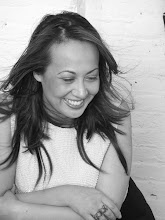Mixed Race Hotties a Mt Holyoke. HAPA thoughts.
So there are in addition to A/PI groups on campus, a new breed of Hapa groups (Hapa: part asian part something else--usually applied to half asian half white but actually means mixed, derived from hawaian slang--google it), and groups for people of mixed race. When we played Mt Holyoke, some girls from "Mixin It Up"-- the mixed race club on campus. I think one of the biggest affirmations of what Slanty Eyed Mama is about, is when younger AAs and particularly Hapas just want a picture or an autograph or a t-shirt. I grew up reading George Wolfe and Alice Walker because I was looking for people writing about being different and yearning to be part of the bigger cultural whole. Whoopi goldberg was a revelation because in so many of her monologues she was talking about feeling one way inside, while being perceived in a different way from the outside. That is the kaleidescopic experience of the Hapa.
When I saw my first real drag queens in Australia I had that experience again. The paradox of having two spirits, many aspects to our physical, historical, ancestral and psychological selves that was injected into our DNA resonated for me in drag performances-- which were playing out those issues in the gender arena. Which is why forever I will be a drag hag.
I have always said (in the most narcissistic way) that people in America of mixed race carry an important role in educating people about race and in breaking the hard walls of assumptions that close in the racist mind. In our biology lies the chemistry of possibility. In our mixed blood lies the fundamental truth that human beings can and will transcend ideas of race to find common ground. We are also vessels for alienation and loneliness-- in our in-between status. If it is a fundamental truth that people want community, that people want to feel like they belong, then the mixed race person is immediately given the challenge of being different from every single person in their ancestral families with the exception of their siblings and /or some cousins. It's no big revelation that when a Hapa kid goes to visit white family s/he is the asian kid and when s/he goes to visit the asian family s/he is the white kid in the family. So where do you fit in if in your own immediate family you are different from everyone? And what is the big deal anyway? You're still the son/daughter...So what is the big deal?
Firstly, everyone always points to high school as a place where we all try to "fit in" with clothes cool clubs, music, being popular etc etc. Kids have breakdowns over owning the right runnign shows or getting excluded from a peer group. So if your biology sets you up to never ever fully be "like" other people, especially early on, the potential for anxiety and self bashing increases i think. The other big deal is the need for us to classify. To label and organize our reactions to people based on names and i.d.s we assign them-- race religion sexuality -- all in the pursuit of knowing which group you fit into. If your family is mixed, you now are outside many of those labels. You can be a freak. You get asked the dreaded "WHAT are you?" a constant reminder that you are other; marginal; non-mainstream; not 'normal'; different; unrecognizable as a peer to other people.
This outsider status is our burden and our genius.
Our burden is to try to feel good while always having to explain (and feel like we have to justify) who we are based on an outward reaction to our look.
The genius is that piece by piece we can build a new vision of multiculturalism that needs must include everyone if the world's children are to be honored as they morph and change the hues of our collective skin. And our spiritual brothers and sisters will be made in the shared experience of all different kinds of mixed race people. The dialogue will have to transcend the particulars of race and move into how we can make the world work for all the people.
I love that in addition to A/PI social and cultural groups on campus, that themixed kids are starting to find each other and talk about stuff. I hope they become the problemsolvers, the mediators and the free thinkers I know they can be. That they move beyond feeling the "what are you stigma" to actually finding interesting, dynamic and healing answers to that question that may lead the whole world the assumption that we are all related and all belong.


0 Comments:
Post a Comment
<< Home